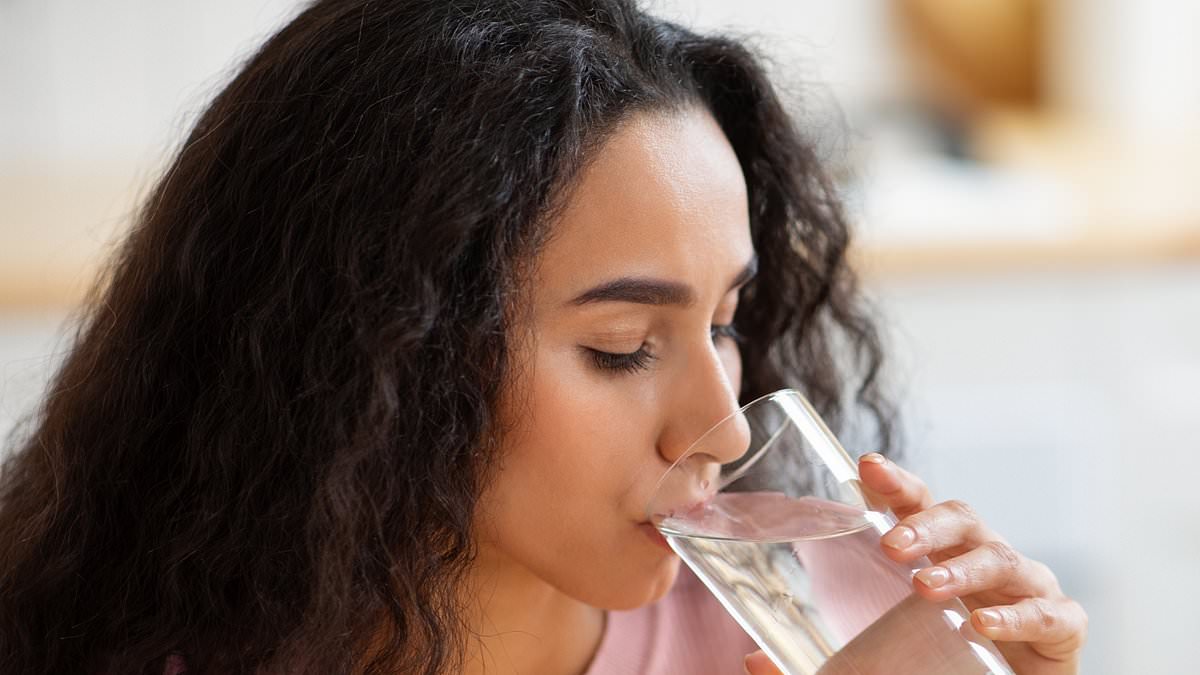An expert has called for calm over fears almost two million ns could have been exposed to cancer-causing chemicals in their drinking water.
A major investigation by the Sydney Morning Herald found that ‘forever chemicals’ were detected in tap water in every state and territory across the country since 2010 – affecting up to 1.8million people.
In recent months, the World Health Organisation has concluded that forever chemical perfluorooctanoic acid (PFOA) is carcinogenic to humans, while the US Environmental Protection Agency found there was no safe level of PFOA or perfluorooctane sulfonate (PFOS) in water.
The chemicals are linked to kidney and liver disease, dysregulation of the thyroid and insulin, cancer, reproductive problems and developmental problems in children.
But UNSW Professor Denis O’Carroll told Daily Mail that had tough regulations that made drinking water safe and warned against residents taking drastic measures such as switching to bottled water.
His message of reassurance has not stopped other experts from urging ns to either invest in a jug with a water filter or have a filtration system installed, even calling on the government to subsidise the purchases.
Prof O’Carroll said whether a person drinks tap or bottled water would make no difference to their exposure to forever chemicals.
‘There’s no reason in my mind to believe that bottled water would be any better, because bottled water has to come from somewhere,’ he said.
‘To assume that bottled water is treated any differently or to any greater extent than, than tap water, would be misleading.
‘It might be (treated differently), but just to make that assumption, would be incorrect.’
The professor, who is the managing director of UNSW’s water research laboratory, said a person would need to be exposed to forever chemicals over a very long time to get sick from them.
‘It’s a long term, chronic type exposure that you would be concerned about,’ he said.
‘(It would be) in decades time, I would suggest, at the low level consumption that most people would be exposed to. It would take a long time to be sick.
‘n guidelines are not as stringent as the US EPA, or in Canada or the European Union, but they are still regulated to fairly low limits.’
A 2011 University of Queensland showed where drinking water in was affected by forever chemicals, but Prof O’Carroll said ‘only a select few (examples) of that tap water would have exceeded US EPA guidelines.
‘That 2011 paper, if you’re looking at it today, would not in any way say that all tap water in is bad from a US EPA perspective,’ he said.
‘That would be completely incorrect.
‘A small amount of those samples – it might be under over 5 per cent – maybe exceed the US EPA guidelines.’
As an expert in the area, the professor has been getting a lot of questions on the safety of water in recent days.
‘I’ve had lots of my co-workers as an example, come to me, very nervous and we need to pay attention as a society what we’re consuming broadly.’
Dr Mariann Lloyd-Smith, who is on the executive committee at the International Pollutant Elimination Network, urged ns to do the ‘best they can’ and invest in a water filter.
‘The makers of these kinds of chemicals have had to pay out many millions of dollars in the US to people who have been exposed and who have suffered cancer,’ she said.
‘Unbelievably though, our regulatory agencies here in just dismiss all of this evidence and say there’s no clear evidence that they cause disease, which honestly is beyond belief.’
A low cost option is a jug filter, however the gold standard is one installed under the sink or a whole-house filtration system.
US non-profit Environmental Working Group found the best filter to remove contaminants was one that relied on a reverse osmosis system.
The system, which would need to be installed, forces the water at high pressure through an extremely thin membrane that separates chemicals from the water.
This type of filter is the most expensive and requires maintenance – though the filters do not have to be replaced as often as carbon or resin ones.
Granular activated carbon filters are also another option – however a study by Duke and North Carolina State universities said some brands made no difference at all.
Prof O’Carroll said residents should be aware of the wide range of chemicals they are exposed to throughout their lives – and used alcohol as an example.
‘Health Canada suggests that you should drink only two drinks of alcohol per week,’ he said.
‘I have a hard time with that and I’m sure many ns and (other) Canadians do as well.
‘So, there’s all kinds of things that we expose ourselves to knowingly, and PFOS is one that we don’t want to expose ourselves to, but it’s not the poison.
‘There’s many other things the we would be concerned about, including PFOS.’
Prof O’Carroll said people can limit their exposure to forever chemicals by paying attention to the labels in consumer products, including old cookware such as Teflon pans.
‘It’s hard, because a lot of these chemicals are legacy,’ he said.
‘In , we’re trying to get away from our exposure, so the government would be trying to limit what comes in (now).
‘But if you have older things in your house, which we all do, it might be a part of them, it might be used in stain resistant carpet or chairs.
‘It could have been used in old cookware (and) in water-repellant clothing.
‘Those are the items where you get exposure.’
NSW:
Bathurst
Blacktown
Campbelltown
Emu Plains
Gundagai
Lithgow
Liverpool
North Richmond
Quakers Hill
Wagga Wagga
Yass
NORTHERN TERRITORY:
Larrakeyah
Nightcliff
QUEENSLAND:
Cairns
Gladstone
ACT:
Canberra
VICTORIA:
Footscray
Riddells Creek
SOUTH :
Glenunga
WESTERN :
Marruben
Rottnest Island
TASMANIA:
Kingborough
*None of these areas exceed the current permitted levels of the ‘s Drinking Water Guidelines
